Overview
In the demanding world of healthcare, providers often face overwhelming emotional challenges. Administrative tasks can weigh heavily, detracting from the vital focus on patient care. Virtual scribes emerge as a beacon of hope, transforming healthcare efficiency by automating these burdensome tasks. This shift allows healthcare providers to dedicate more time to what truly matters: their patients.
Imagine a scenario where documentation time is significantly reduced, leading to less administrative stress. The article highlights how AI-driven virtual scribes have made this a reality, enabling providers to enhance patient interactions and mitigate burnout. This not only fosters a more compassionate healthcare environment but also nurtures the well-being of those who care for others.
As we reflect on these advancements, consider how much more fulfilling healthcare could be with reduced administrative burdens. By embracing virtual scribes, we can create a supportive atmosphere where healthcare providers can thrive. Together, let’s advocate for solutions that prioritize both patient care and the well-being of those who deliver it.
Introduction
In the fast-paced realm of healthcare, many providers feel overwhelmed by the weight of administrative tasks, which often distract from their true mission: patient care. This burden can lead to frustration and a sense of disconnect from those they serve. Yet, the emergence of virtual scribes, particularly those powered by AI, offers a promising solution. These digital assistants can help medical professionals reclaim precious time, allowing them to focus on enhancing the quality of their interactions with patients.
As healthcare providers consider integrating virtual scribes into their practices, it’s essential to reflect on how these tools can streamline operations. Imagine a world where administrative duties are managed efficiently, freeing up time for meaningful conversations with patients. This not only improves workflow but also fosters deeper connections, ultimately benefiting both providers and patients alike.
The journey toward adopting virtual scribes is not just about efficiency; it’s about nurturing relationships. By embracing this technology, healthcare professionals can create a more compassionate environment that prioritizes patient needs. Let us explore how these digital assistants can transform your practice, allowing you to focus on what truly matters—caring for your patients.
CosmaNeura: Streamline Administrative Tasks with AI-Powered Virtual Scribes
In the demanding world of healthcare, providers often face overwhelming administrative duties that can detract from their primary focus on patient care, which is where a virtual scribe can be beneficial. CosmaNeura's AI-driven digital assistants serve as virtual scribes, offering a compassionate solution by automating routine tasks like intake and documentation. This allows medical professionals to dedicate more time to meaningful interactions with their patients, ultimately enhancing the quality of care delivered.
As we look to 2024, it's heartening to note that 21% of physicians are now utilizing a virtual scribe for documentation, a significant rise from 13% in 2023. This trend reflects a growing reliance on a virtual scribe to ease the burden of administrative tasks. By lightening this load, virtual scribes not only enhance operational efficiency but also ensure that care remains compassionate and patient-centered.
Moreover, the integration of AI with a virtual scribe in administrative functions has been shown to reduce errors and enhance accuracy, creating a more organized medical environment. With 80% of medical leaders recognizing , the role of virtual scribes in transforming service delivery becomes increasingly clear.
Imagine a future where healthcare providers can fully engage with their patients by using a virtual scribe, free from the constraints of paperwork. This vision is within reach, and we encourage you to explore how AI can support your practice in delivering compassionate care. Together, we can embrace the potential of technology to foster a more nurturing healthcare experience.
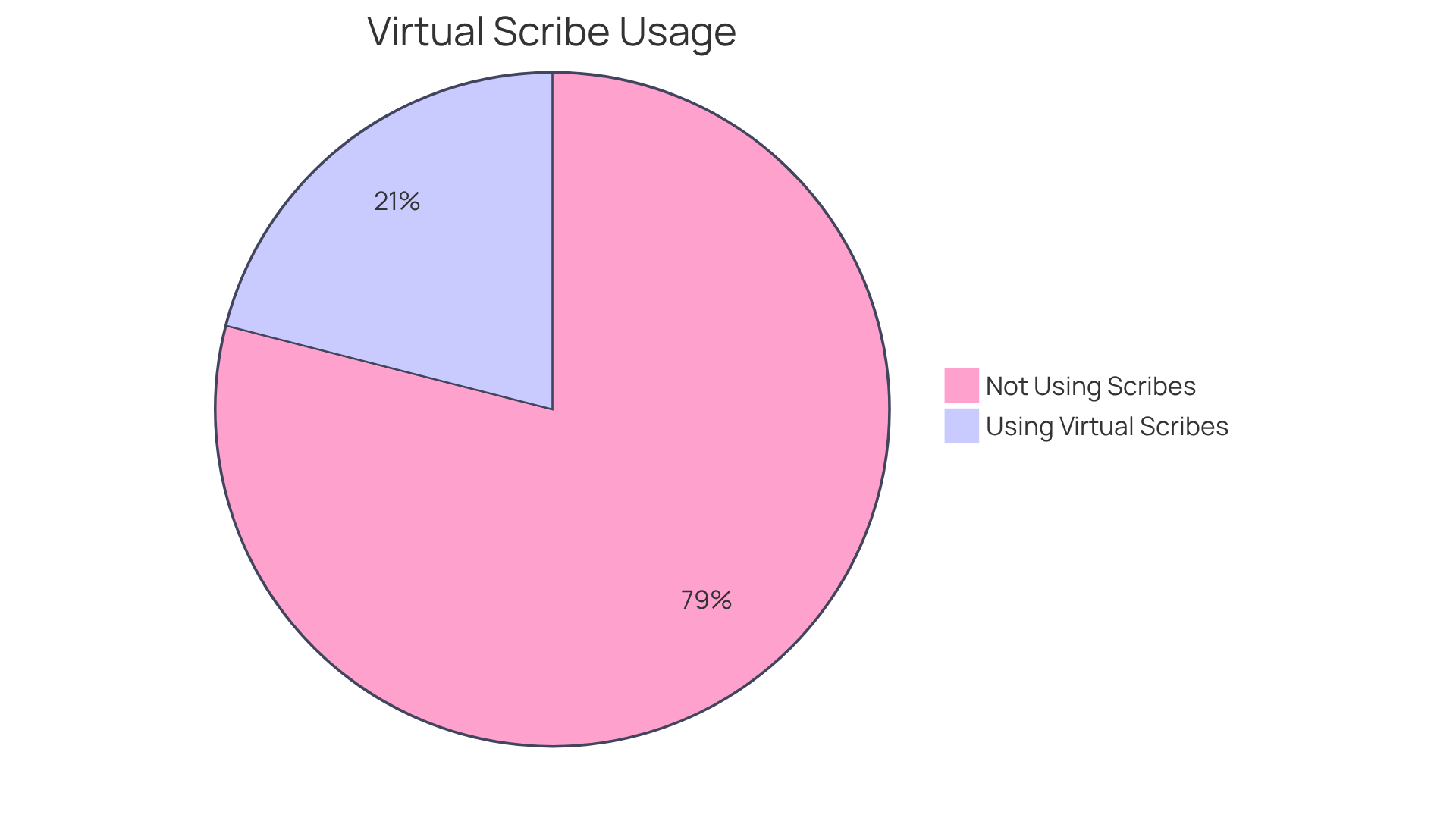
Foundational Training: Equip Your Team for Effective Virtual Scribe Integration
To truly support our dedicated healthcare teams, it is essential to recognize the they face. The pressures of administrative burdens can weigh heavily, impacting not only their workflow but also patient care. To alleviate these concerns, thorough foundational training for virtual scribes becomes crucial. This training should encompass not just the technical skills required to navigate the AI platform, but also best practices that foster user engagement.
By equipping employees with these vital skills, organizations can facilitate a seamless integration of remote assistants into daily tasks. This not only enhances operational effectiveness but also nurtures patient contentment. Imagine a workplace where healthcare providers feel empowered and supported, ultimately leading to improved patient experiences.
Emphasizing continuous education and adaptability is key. It ensures that teams can harness AI effectively, fully realizing the benefits of virtual scribes in the medical environment. Let’s commit to providing the necessary resources and support, so our healthcare professionals can thrive in their roles and deliver the compassionate care that patients deserve.
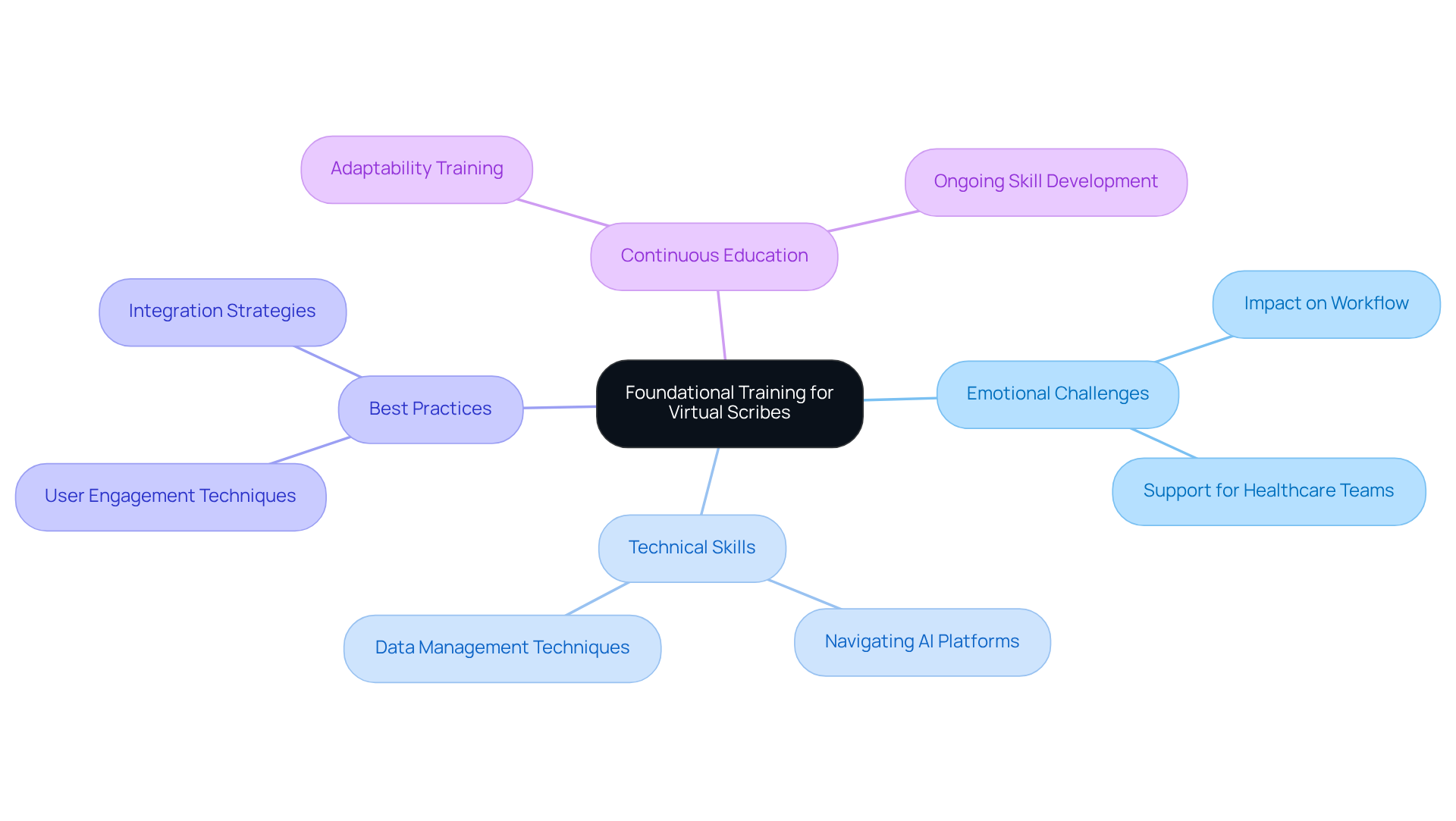
HIPAA Training: Ensure Compliance and Security with Virtual Scribes
Incorporating a virtual scribe into medical practices can feel daunting for many healthcare providers. The emotional weight of ensuring patient confidentiality and secure information management is significant. With an alarming average of 1.94 data breaches involving 500 or more records occurring daily in 2022, the urgency for is clear. How can we support our teams in navigating these challenges?
By prioritizing extensive HIPAA training for all staff members, we can foster a culture of compliance and trust. This training should not only emphasize the importance of confidentiality but also equip team members with the knowledge necessary to confidently utilize a virtual scribe. Imagine the peace of mind that comes from knowing your practice is safeguarding sensitive information while enhancing patient care.
Moreover, ongoing security awareness training is essential in our ever-evolving digital landscape. When there are material changes to policies and procedures, refresher training should be provided to maintain workforce awareness. Documenting these training sessions is crucial for compliance, as it helps track the workforce's training history. As Steve Alder, editor-in-chief of The HIPAA Journal, wisely notes, "Refresher training only has to be provided to those the change affects; but, if the training relates to a change in HIPAA policies and procedures, the training must be documented."
Such thorough training not only mitigates risks related to data breaches but also nurtures a culture of responsibility and alertness within the organization. This commitment ultimately enhances the overall quality of care we provide. Let’s embrace these training opportunities together, ensuring we are well-equipped to face the challenges ahead.
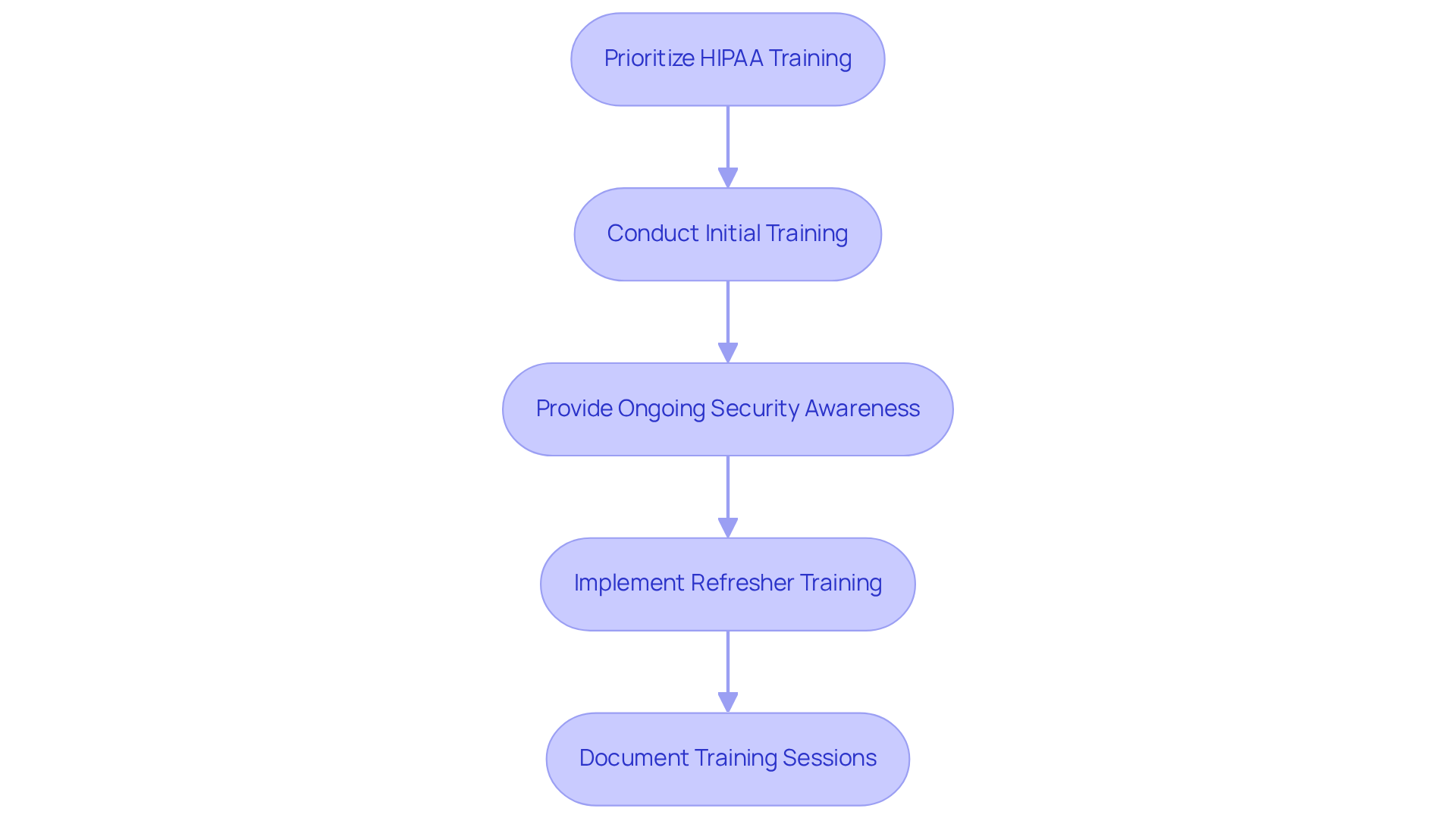
Time Efficiency: Maximize Patient Care with Real-Time Support from Virtual Scribes
Healthcare professionals often face emotional challenges that can hinder their ability to provide the best care. The administrative burdens they carry can detract from the time spent with individuals, leaving them feeling overwhelmed. Imagine regaining up to three hours each week to dedicate to those who truly need attention.
Virtual scribes step in to by effectively managing documentation and administrative tasks in real-time. This not only enhances the experience for individuals but also leads to better health outcomes. Research indicates that:
- 84% of doctors feel AI assistants positively impact their interactions with clients.
- 55% report reduced stress and burnout.
Clinicians utilizing virtual assistants find they spend 69.5% less time on documentation, averaging just 100 seconds per encounter compared to 329 seconds without support. This newfound efficiency fosters a more engaging atmosphere for individuals, ultimately maximizing the quality of care provided.
How might your practice transform with this additional time? Embrace the support of a virtual scribe and witness the positive changes in both your workload and patient interactions.
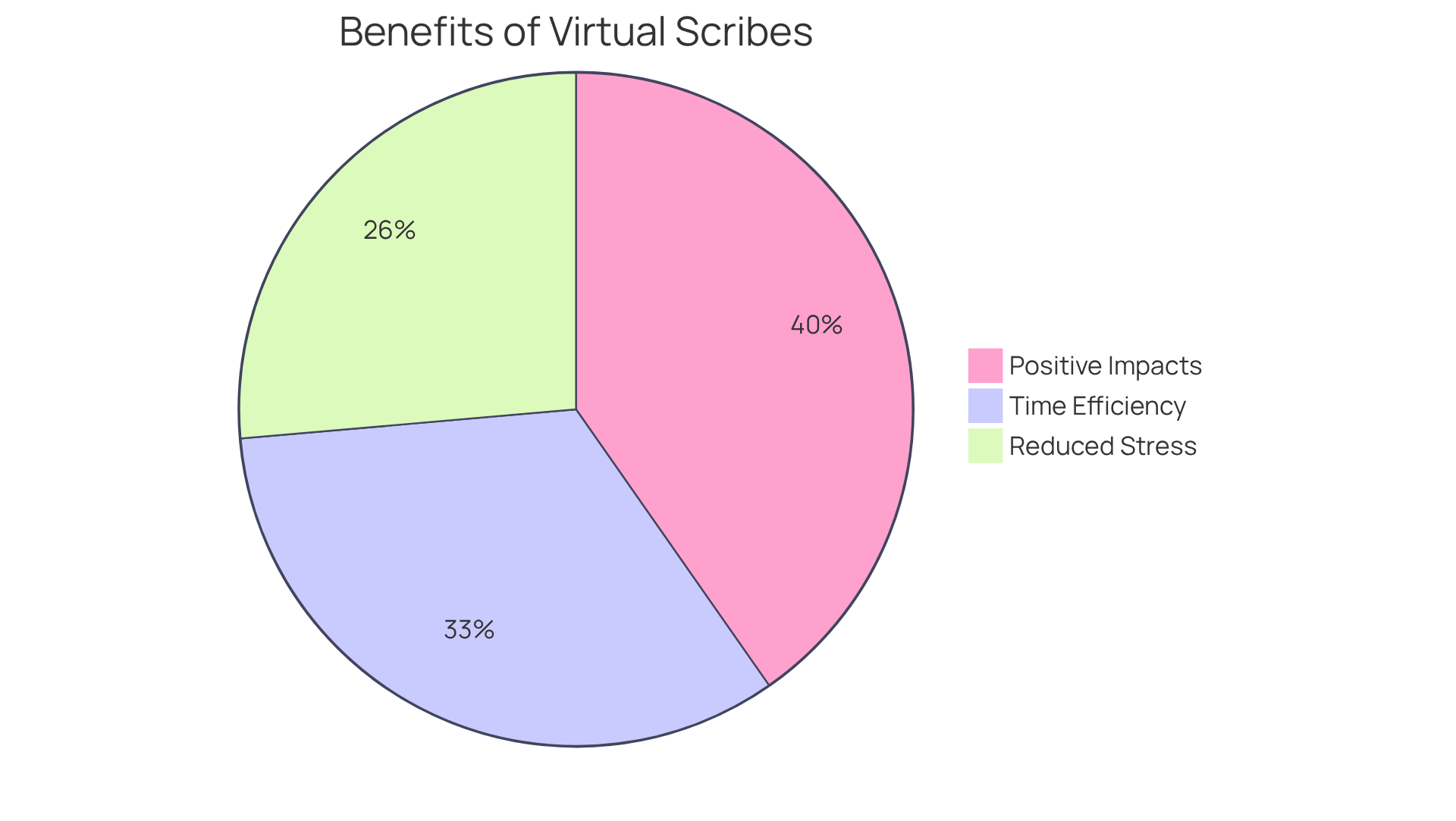
Enhanced Patient Relationships: Foster Better Communication with Virtual Scribes
The quality of interactions between medical professionals and those they serve is significantly enhanced by virtual scribes. By alleviating the burden of administrative tasks, providers can connect more deeply with individuals. This shift fosters grounded in active listening and thoughtful responses to concerns. Have you ever felt that your time could be better spent listening to patients rather than managing paperwork? This is exactly the change that a virtual scribe brings.
As a result, individuals often express feeling more valued and understood—an essential component of effective healthcare. Statistics reveal that 68% of clinicians have experienced a lighter administrative load thanks to AI assistants, leading to improved communication dynamics. Imagine a workday where nearly half of clinicians report minimal to no after-hours documentation, allowing for more time with family and personal pursuits.
This newfound efficiency not only enhances clinician well-being but also cultivates a more compassionate care environment. The benefits are clear: improved satisfaction and trust in the healthcare system. Let’s explore how these changes can make a difference in your practice and the lives of those you care for.
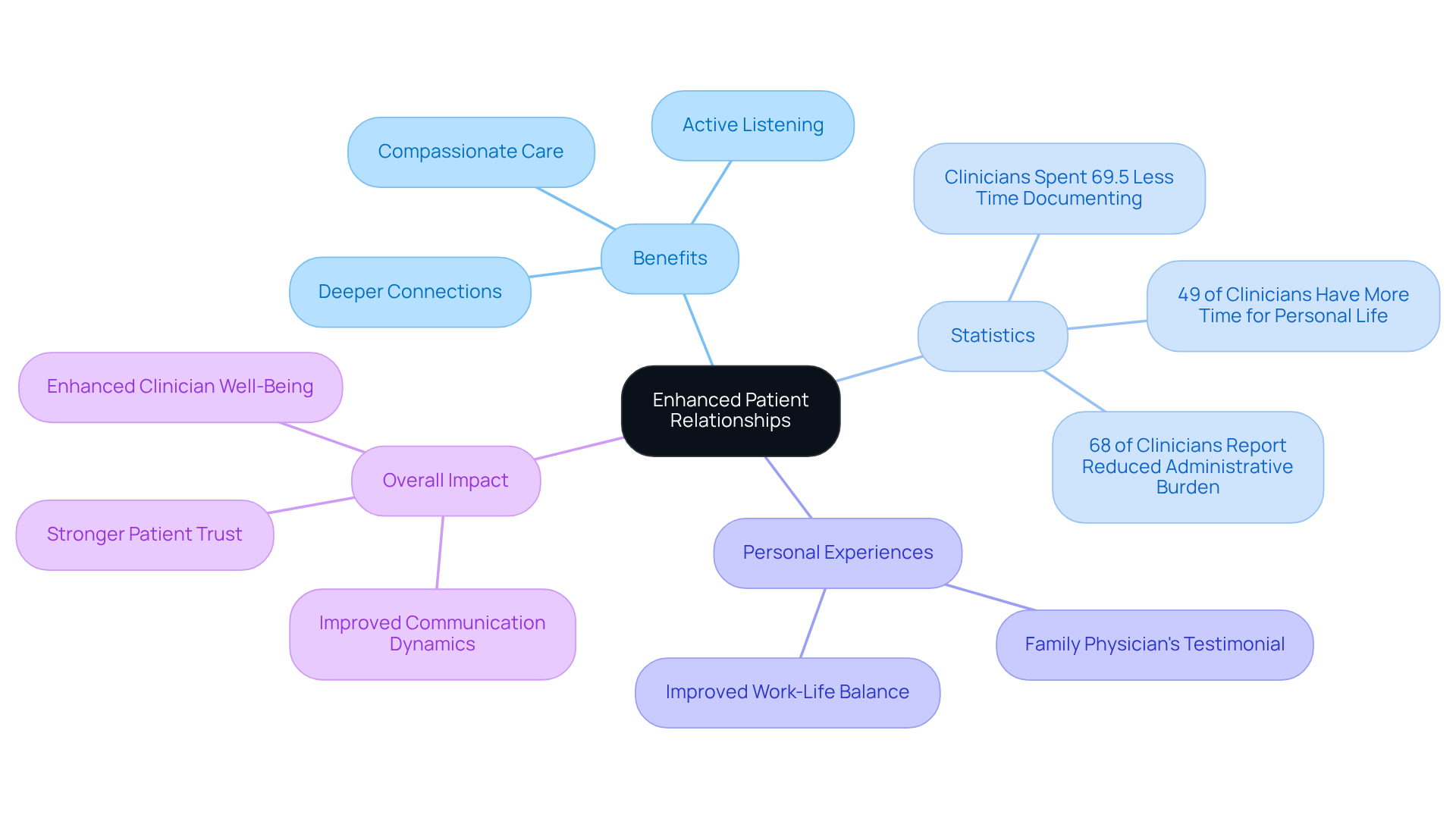
Cost-Effective Solutions: Reduce Overhead with Virtual Scribes
Introducing virtual scribes can lead to significant cost reductions for medical practices while addressing the emotional challenges that healthcare providers encounter. By minimizing reliance on additional administrative staff and optimizing workflows, organizations can lower overhead costs while ensuring high-quality patient care. The medical sector currently spends approximately $1.2 trillion annually on administration. Imagine if automation and analytics tools could eliminate between $200 billion and $360 billion in annual spending, as projected by McKinsey research. This cost-effectiveness makes virtual scribes an attractive option for practices aiming to without compromising service quality.
As Sam Schwager, CEO of SuperDial, noted, 'There’s a huge opportunity for agentic AI to get that figure down.' Furthermore, consider the revenue cycle management (RCM) market, valued at $20.6 billion last year, which is projected to grow at over 24% annually, reaching $70.1 billion by 2030. The incorporation of virtual scribes is increasingly essential for healthcare providers aiming to navigate financial challenges and enhance profitability.
A case study titled 'Impact of AI on Healthcare Administration Costs' emphasizes how implementing automation can lead to substantial cost reductions. This further strengthens the argument for virtual scribes, which provide a supportive solution for those in the healthcare field. Could embracing these technologies be the key to alleviating some of your administrative burdens? The potential benefits are clear, and the opportunity to improve both care quality and operational efficiency is within reach.
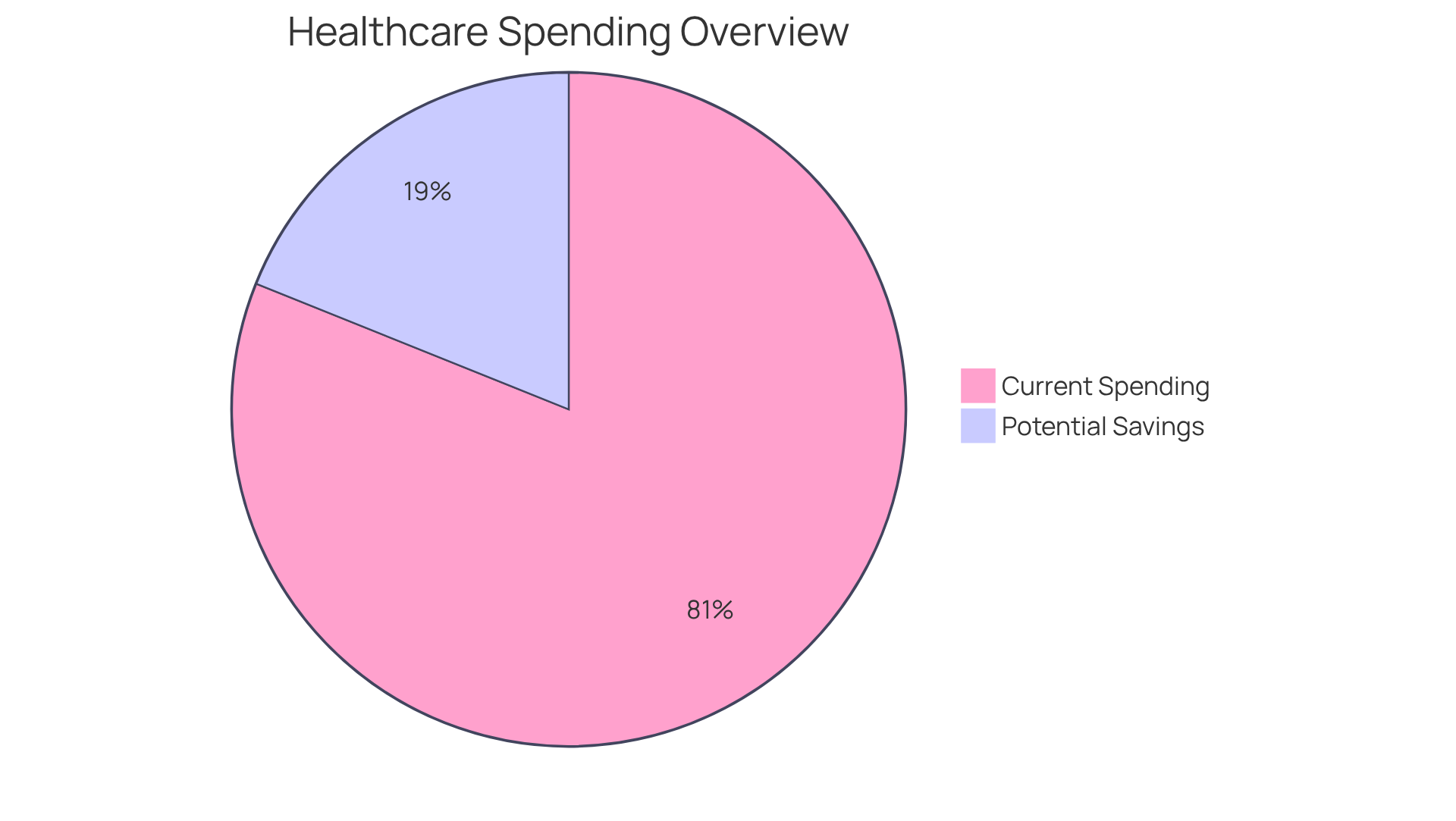
Telehealth Support: Improve Documentation and Efficiency with Virtual Scribes
Digital assistants play a vital role in telehealth, offering immediate documentation support during online consultations. Have you ever felt overwhelmed by the administrative tasks that come with patient care? This capability ensures that all client interactions are meticulously recorded, which is essential for compliance and continuity of care. By simplifying the documentation process, a virtual scribe significantly enhances the efficiency of telehealth sessions, allowing providers to focus more on meaningful client engagement.
Consider this:
- 84% of physicians reported that AI assistants positively influenced their interactions with individuals.
- Additionally, 39% of those receiving care felt they experienced more direct communication from their doctors.
This technology not only alleviates the administrative burden on medical providers but also fosters a deeper connection between doctors and individuals. Ultimately, this leads to in a remote environment, ensuring that patients feel valued and understood.
As we embrace these innovative solutions, let's reflect on how they can transform our interactions and enhance the overall healthcare experience. Are you ready to explore the potential of digital assistants in your practice?
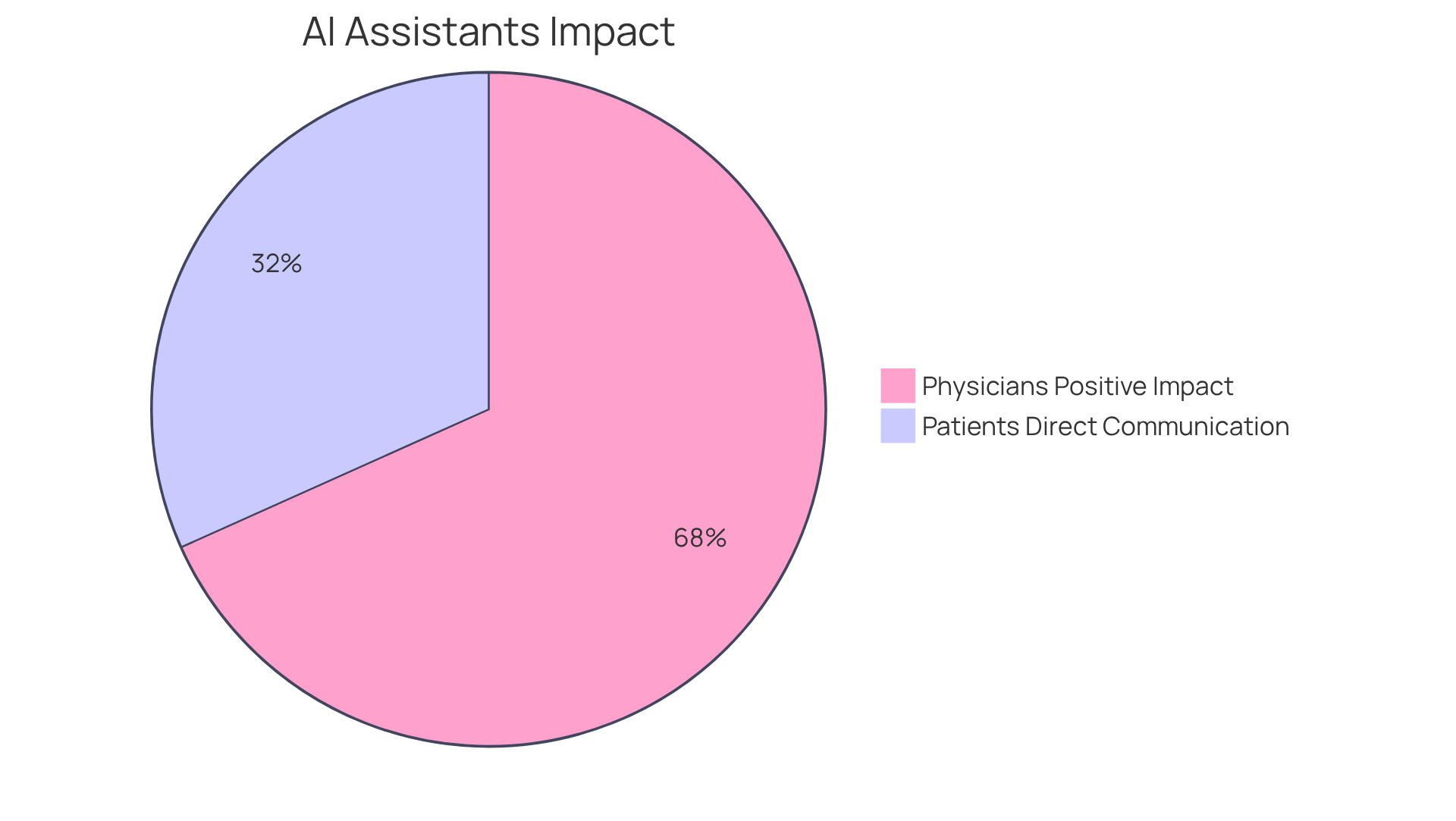
Diagnostic Guidance: Leverage Virtual Scribes for Enhanced Clinical Decision-Making
Healthcare professionals often face overwhelming emotional challenges in their daily practice. Digital assistants can be a vital source of support, providing diagnostic advice through thoughtful interactions with individuals. By carefully analyzing data and suggesting differential diagnoses, these AI-driven tools enhance clinical decision-making, allowing providers to focus more on what truly matters: their patients.
Imagine a world where AI algorithms improve diagnostic precision by up to 30%. This capability enables healthcare providers to make informed decisions swiftly, ultimately leading to for individuals. Additionally, the use of AI tools, such as digital note-takers, alleviates the administrative burden on doctors. This shift allows them to dedicate more time to meaningful in-person interactions, reinforcing their commitment to ethical and compassionate care.
By embracing generative AI, medical professionals can streamline workflows and reduce the time spent on documentation. This not only enhances satisfaction for both providers and individuals but also leads to improved outcomes. Case studies reveal that the use of virtual scribes has effectively reduced physician burnout, enabling providers to concentrate more on care and transforming the medical experience for everyone involved.
As we navigate the complexities of healthcare, it’s essential to recognize the powerful role that digital assistants can play. How might these tools change your experience in providing care? Let’s explore the potential of AI together and foster a more compassionate healthcare environment.
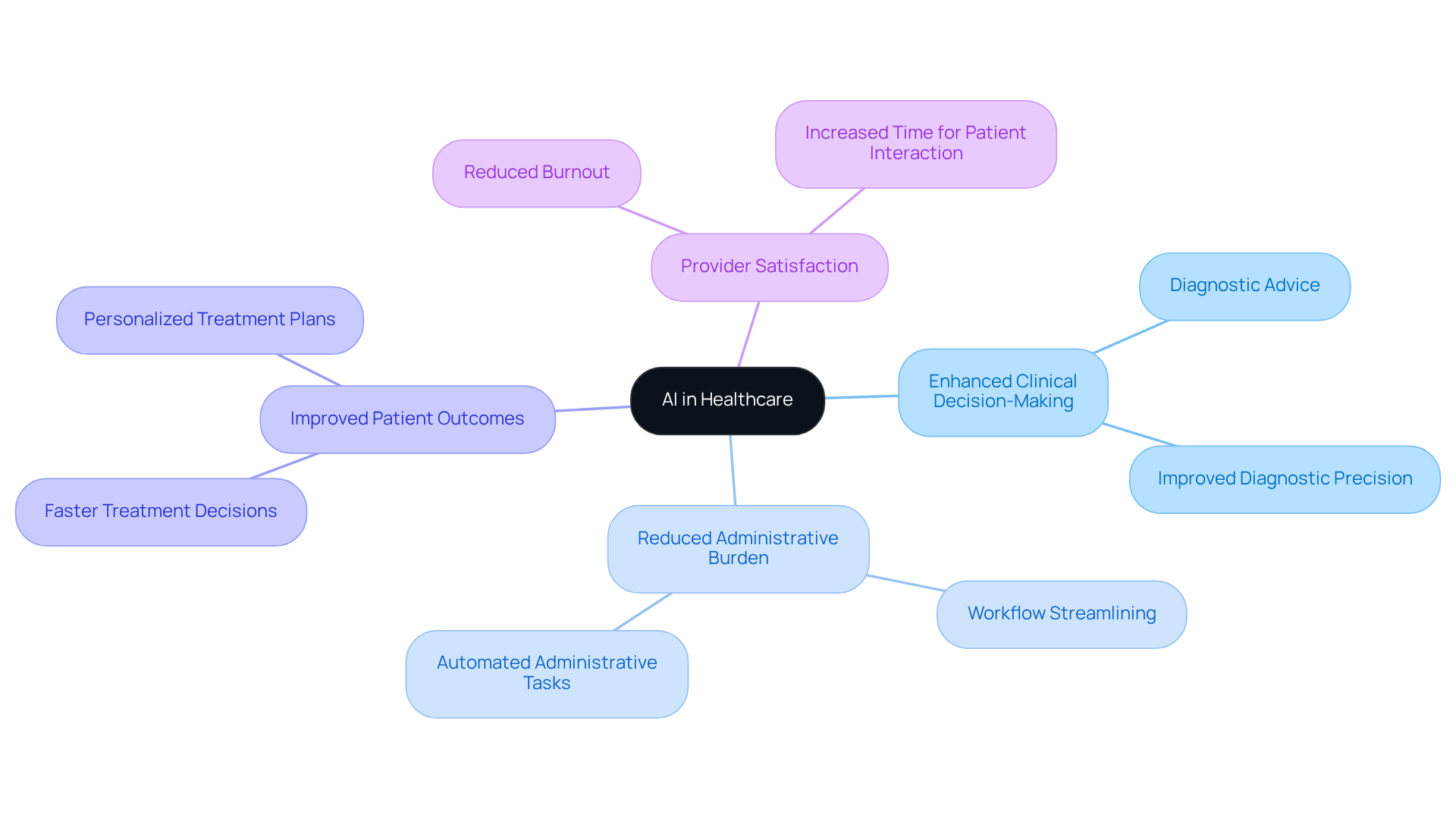
Security & Time Tracking: Maintain Oversight with Virtual Scribes
In the demanding world of healthcare, the role of virtual scribes is vital in alleviating the stress of administrative tasks and significantly boosting efficiency. They not only enhance security and time tracking but also provide a reliable audit trail by meticulously recording client interactions. This thorough oversight is crucial for maintaining accountability and adhering to , especially as healthcare organizations face increasing scrutiny regarding compliance. How can we preserve trust and integrity in care for individuals? By addressing these challenges head-on, we can ensure that our focus remains on those we serve.
As medical providers grapple with the weight of administrative burdens, the integration of AI solutions in time tracking emerges as a beacon of hope. These technologies empower healthcare professionals to reclaim valuable hours that were once lost, allowing them to devote more time to patient care. Imagine a world where generative AI can automate labor-intensive tasks, such as appointment scheduling and documentation. This shift not only enhances operational effectiveness but also strengthens compliance structures, ultimately leading to better outcomes for individuals.
As we embrace the future of healthcare with the help of a virtual scribe, we must recognize the profound impact they have on our practices. By alleviating administrative pressures, we create an environment where healthcare providers can thrive, focusing on what truly matters—the care of individuals. Let’s take this step together, enhancing our workflows and fostering a culture of compassion and integrity in our organizations.
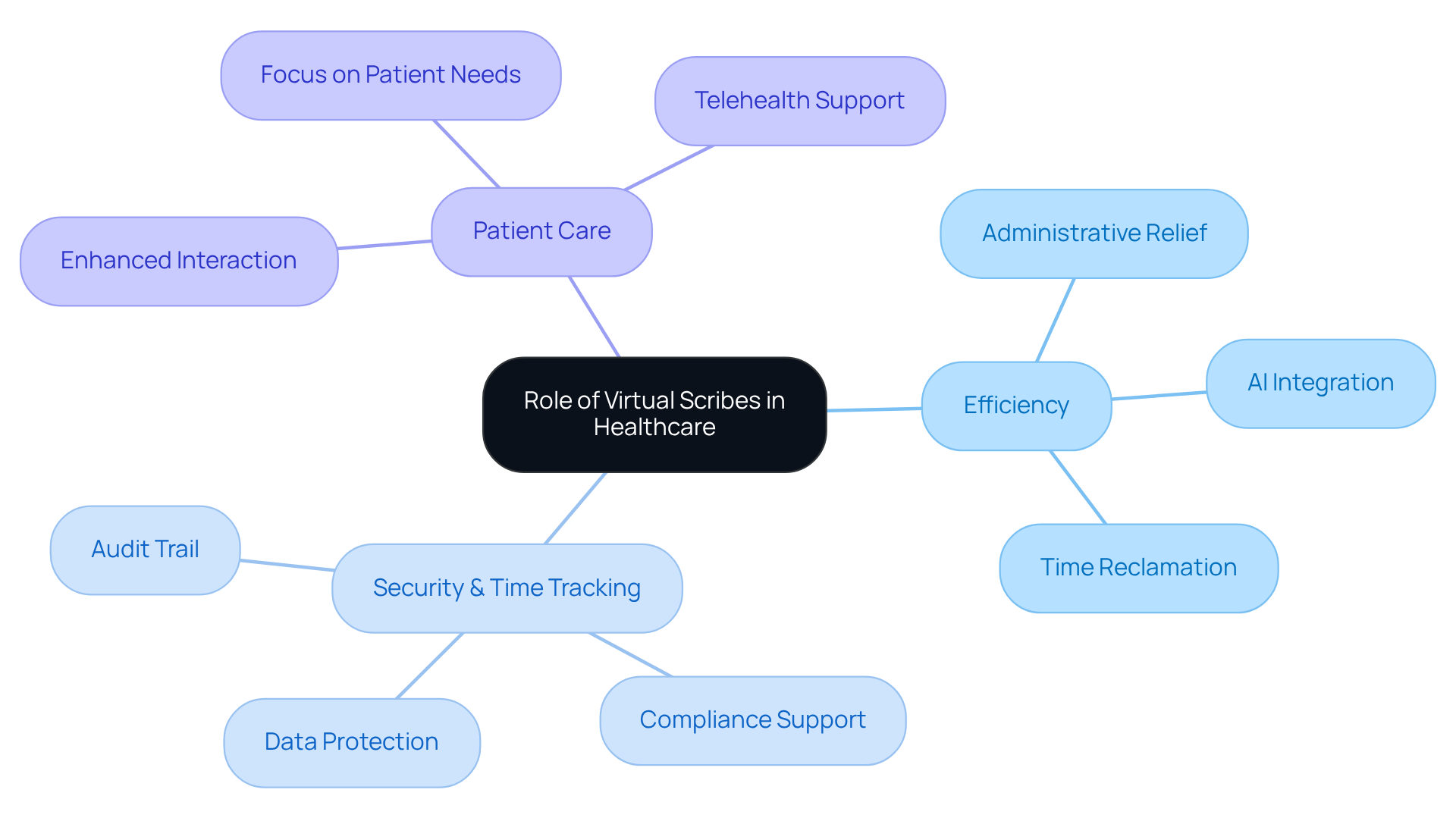
Comprehensive Benefits: Unlock the Full Potential of Virtual Scribes in Healthcare
Incorporating digital note-takers into medical practices brings forth numerous benefits that can significantly ease the burdens faced by healthcare providers. Imagine a world where efficiency is enhanced, patient connections are strengthened, costs are reduced, and clinical decision-making is improved. By embracing the capabilities of digital assistants, medical providers can transform their operations, ensuring they deliver empathetic, high-quality care while upholding ethical standards.
This strategic approach not only positions organizations for success in a competitive healthcare landscape but also resonates with the growing trend of in the industry. Consider this: a study revealed that 82% of doctors reported greater overall work satisfaction due to AI assistants, while 84% noted a positive impact on their interactions with patients. These statistics illustrate the profound difference that technology can make in the daily lives of healthcare professionals.
Moreover, frequent users of AI tools saved two and a half times more time per note compared to their less regular counterparts. This highlights the remarkable efficiency improvements achievable through this innovative technology. As healthcare continues to evolve, the pivotal role of virtual scribes will be essential in reshaping operational workflows and enhancing the quality of care.
By addressing the pressing challenges faced by healthcare providers, we can foster a more patient-centered approach. Let us embrace these advancements together, ensuring that compassionate care remains at the forefront of our healthcare practices.
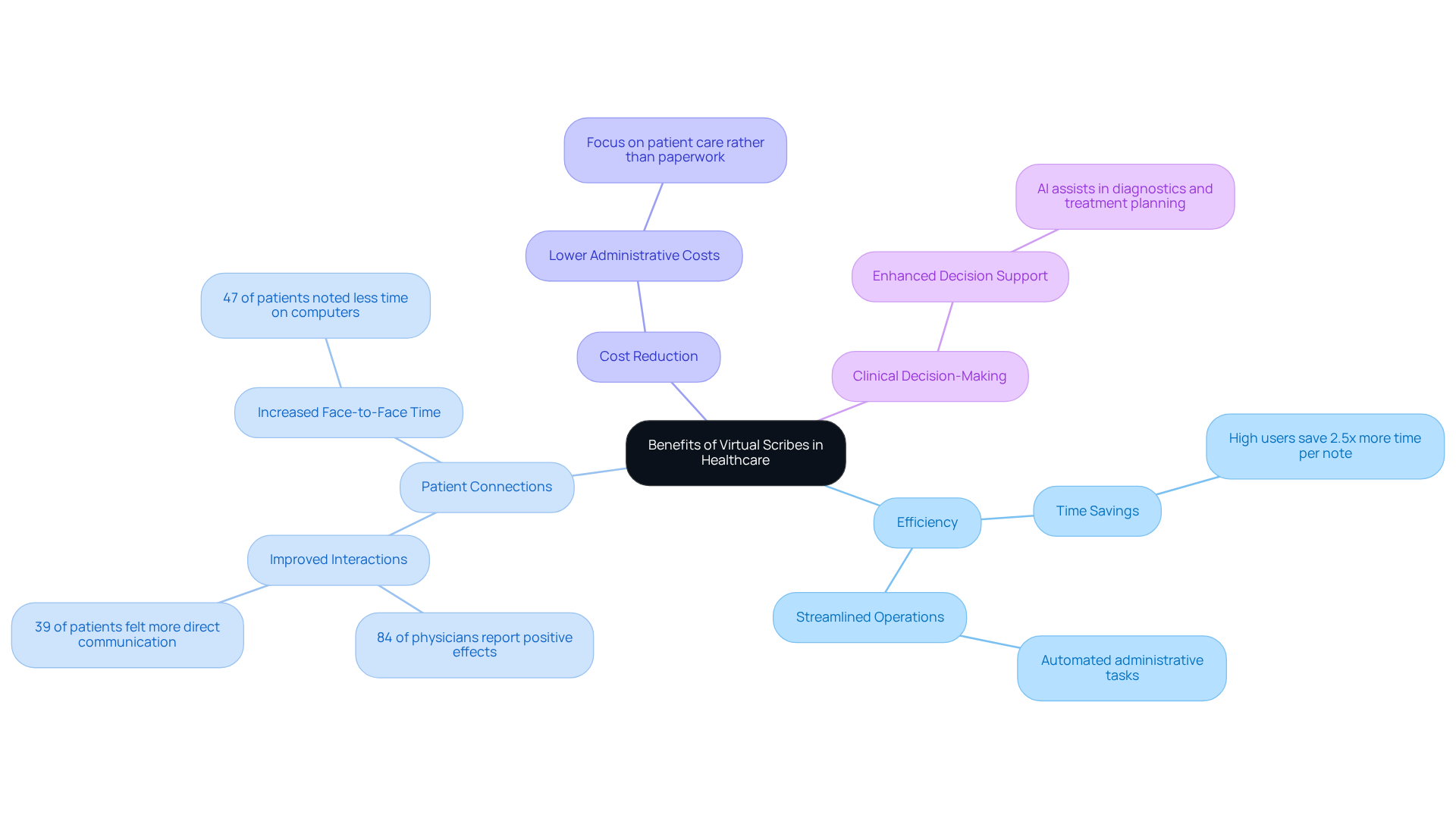
Conclusion
The integration of virtual scribes into healthcare practices signifies a transformative shift towards greater efficiency and enhanced patient care. By alleviating the administrative burdens that often overwhelm healthcare providers, these AI-driven assistants empower professionals to focus on what truly matters: meaningful interactions with patients. As the trend of utilizing virtual scribes continues to grow, it becomes increasingly clear that they play a crucial role in fostering a more compassionate and effective healthcare environment.
Have you felt the weight of administrative tasks pulling you away from patient care? Throughout this article, we have highlighted various benefits of virtual scribes, including:
- Time savings
- Improved patient relationships
- Cost reductions
The statistics reveal a significant decrease in documentation time and an increase in clinician satisfaction, demonstrating how these tools can enhance both the quality of care and the well-being of healthcare providers. Furthermore, the emphasis on comprehensive training and HIPAA compliance underscores the importance of integrating virtual scribes effectively into medical practices.
As we reflect on the potential of virtual scribes, it is essential for healthcare professionals to embrace this innovative technology. By doing so, practices can not only improve operational efficiency but also create a more patient-centered approach that prioritizes compassionate care. Imagine a future where providers can thrive, and patients receive the attention they deserve. As the healthcare landscape evolves, the adoption of virtual scribes will be pivotal in shaping this compassionate future.




